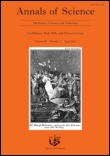
ANNALS OF SCIENCE
Scope & Guideline
Connecting Past Discoveries with Future Philosophies
Introduction
Aims and Scopes
- Historical Analysis of Scientific Practices:
The journal emphasizes a historical perspective on scientific practices, exploring how methodologies have evolved over time and how they have been influenced by cultural and societal factors. - Interdisciplinary Approaches:
It encourages contributions that bridge various disciplines, including history, philosophy, sociology, and the natural sciences, to foster a comprehensive understanding of scientific evolution. - Focus on Key Historical Figures and Events:
The journal frequently highlights significant historical figures, discoveries, and events, analyzing their impact on the development of scientific knowledge and practices. - Cultural and Social Contexts of Science:
It investigates the relationships between scientific advancement and cultural, social, and political contexts, shedding light on how these elements shape scientific discourse. - Innovative Methodologies in Historical Research:
The journal is open to exploring and adopting innovative methodologies for historical research, including quantitative approaches and digital humanities.
Trending and Emerging
- Intersections of Science and Technology:
There is a growing focus on the relationship between scientific development and technological innovation, particularly how technology has shaped scientific practices and vice versa. - Environmental History and Science:
Emerging themes in environmental history are evident, where researchers investigate the historical interactions between scientific practices and ecological changes, highlighting the relevance of science in contemporary environmental issues. - Cultural History of Science:
An increasing interest in the cultural dimensions of science is emerging, examining how cultural narratives, representations, and identities influence scientific discourse and practice. - Science and Globalization:
The journal is witnessing a rising trend in exploring the implications of globalization on scientific practices, knowledge dissemination, and the international collaboration of scientists. - Public Engagement with Science:
There is a notable trend towards studying the public's interaction with science, including how scientific knowledge is communicated and contested in various societal contexts.
Declining or Waning
- Traditional Narratives of Scientific Progress:
There has been a noticeable decline in papers adhering strictly to traditional narratives of linear scientific progress, as scholars increasingly critique and seek to complicate these simplistic frameworks. - Overemphasis on Individual Contributions:
The focus on individual scientists as solitary geniuses is waning, with a growing recognition of collaborative and collective efforts in scientific advancements. - Neglect of Non-Western Scientific Traditions:
The journal has seen fewer contributions that explore non-Western scientific traditions, indicating a potential area that requires revitalization to achieve a truly global perspective on science. - Reductionist Views on Science and Society:
There is a diminishing emphasis on reductionist views that separate science from its societal implications, as researchers are now more inclined to explore the intricate entanglements between science and broader societal issues. - Historical Isolationism in Scientific Study:
The trend of examining scientific developments in isolation from their international contexts is declining, with an increasing focus on transnational exchanges and influences.
Similar Journals

PHYSICS IN PERSPECTIVE
Advancing Understanding Through Historical ContextPHYSICS IN PERSPECTIVE, published by SPRINGER BASEL AG, is an esteemed journal dedicated to the intricate interplay between the history of physics and its contemporary implications. With an ISSN of 1422-6944 and an E-ISSN of 1422-6960, this journal has established itself as a pivotal resource for researchers, scholars, and students who seek a deeper understanding of physics through a historical lens. The journal enjoys a Q1 ranking in History and a Q3 ranking in Physics and Astronomy (miscellaneous), illustrating its significance in the arts and humanities as well as its notable contributions to physics scholarship. Published in Switzerland, it provides a unique platform for interdisciplinary dialogue, combining historical analysis with modern physics discussions. As it continues to grow through its converged years from 1999 to 2024, PHYSICS IN PERSPECTIVE remains committed to enriching the academic community and fostering innovative research that bridges the past and present of the physical sciences.
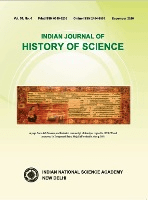
INDIAN JOURNAL OF HISTORY OF SCIENCE
Fostering Interdisciplinary Insights into Scientific HistoryINDIAN JOURNAL OF HISTORY OF SCIENCE, published by the Indian National Science Academy, offers a vital platform for researchers, professionals, and students dedicated to the exploration of the historical development of science and technology in India and beyond. With the ISSN 0019-5235 and E-ISSN 2454-9991, this peer-reviewed journal aims to promote interdisciplinary collaboration by publishing original research articles, reviews, and discussion papers that highlight the contributions and evolution of scientific thought throughout history. The journal fosters a unique understanding of how historical contexts have shaped current scientific paradigms, making it an essential resource for academic inquiry. Although it does not currently offer Open Access options, the journal's rigorous editorial standards ensure that it maintains a significant impact within the scholarly community, serving as a crucial reference point for historical scholarship in the sciences. Its address in Bahadur Shah Zafar Marg, New Delhi 110 002, India, situates it within a rich tapestry of cultural and academic heritage, further enhancing its significance in the field.
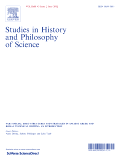
STUDIES IN HISTORY AND PHILOSOPHY OF SCIENCE
Charting the Philosophical Landscape of Scientific ProgressSTUDIES IN HISTORY AND PHILOSOPHY OF SCIENCE, published by Elsevier Science Ltd, is a leading academic journal dedicated to the exploration of historical and philosophical dimensions of science. With both an ISSN of 0039-3681 and E-ISSN of 1879-2510, this esteemed journal has established itself as a pivotal resource since its inception in 1970 and continues to publish cutting-edge research reflecting the evolution of scientific thought. Situated in the United Kingdom, it is recognized for its high-impact contributions, boasting a Q1 ranking in both History and History and Philosophy of Science categories as of 2023. Researchers in the humanities will benefit from the journal’s rigorous analysis and insightful discussions, as evidenced by its competitive Scopus rankings—placing it in the 96th and 83rd percentiles in their respective fields. Although not an open-access journal, it maintains a commitment to scholarly excellence, aiming to foster a deeper understanding of the interconnections between historical context and philosophical inquiry in the scientific domain, making it an invaluable resource for students, professionals, and researchers alike.

Foundations of Science
Delving into the Intersections of Science and PhilosophyFoundations of Science is a renowned academic journal published by SPRINGER, dedicated to the interdisciplinary exploration of both the historical and philosophical dimensions of science. Established in 1995 and based in the Netherlands, this journal has carved out a significant niche within the History and Philosophy of Science and Multidisciplinary fields, holding an impressive Q2 ranking in both categories as of 2023. The journal's rigorous peer-review process ensures the dissemination of high-quality research, supported by its Scopus rankings, which place it in the top 15% of its peer group in History and Philosophy of Science and the top 28% in Multidisciplinary studies. Although not an open-access journal, Foundations of Science remains accessible through various academic channels, making its vital contributions to the discourse surrounding scientific foundations available to a broad audience. By fostering dialogue across disciplines, it plays a crucial role in advancing the understanding of science's philosophical underpinnings and its historical development, making it an essential resource for researchers, professionals, and students alike.
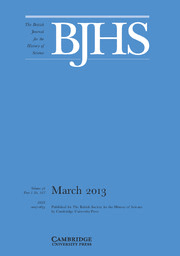
BRITISH JOURNAL FOR THE HISTORY OF SCIENCE
Illuminating the evolution of scientific thought.The British Journal for the History of Science is a premier academic publication dedicated to exploring the intricate relationship between science and society throughout history. Published by Cambridge University Press, this journal features a rich blend of original research articles, critical reviews, and scholarly discussions that illuminate the development of scientific ideas and practices from antiquity to the modern era. With a strong reputation reflected in its Q1 classification in History and Q2 in History and Philosophy of Science for 2023, this journal plays an essential role in advancing the field by engaging researchers, professionals, and students alike. The journal's commitment to intellectual rigor and cross-disciplinary dialogue fosters a deeper understanding of how scientific thought has shaped our world. Although it does not offer open access, the journal maintains a strong academic footprint, making significant contributions to historical scholarship. Join a community of scholars who are passionate about unfolding the rich tapestry of scientific history, as the British Journal for the History of Science continues to publish cutting-edge research until 2024.
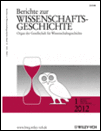
Berichte zur Wissenschaftsgeschichte
Connecting Disciplines, Enriching Scientific NarrativesBerichte zur Wissenschaftsgeschichte is a distinguished journal dedicated to the critical exploration of the history of science and its philosophical underpinnings, published by WILEY-V C H VERLAG GMBH in Germany. Since its inception in 1978, this authoritative journal has served as a vital resource for scholars, practitioners, and students alike, contributing to a deeper understanding of scientific developments across historical contexts. The journal holds a respectable Scopus rank in the arts and humanities, placing it in the 79th percentile among history publications and the 56th percentile in history and philosophy of science, marking it as an essential venue for impactful research. Berichte zur Wissenschaftsgeschichte encourages contributions that advance scholarly dialogue and foster an interdisciplinary approach, making it a pivotal platform for the exchange of ideas in the evolving discourse of science history. While it currently does not offer Open Access options, the journal's subscription model ensures that its curated content remains accessible to a global audience dedicated to the interdisciplinary analyses of science's past.

HISTORY AND PHILOSOPHY OF THE LIFE SCIENCES
Exploring the Nexus of History and Philosophy in Life SciencesHISTORY AND PHILOSOPHY OF THE LIFE SCIENCES, published by SPRINGER INT PUBL AG, stands as a leading peer-reviewed journal dedicated to exploring the intricate relationships between historical narratives and philosophical frameworks in the life sciences. With its robust impact factor and recognized position as a Q1 journal in key categories such as Arts and Humanities, History, and History and Philosophy of Science, this journal provides a vital platform for researchers, professionals, and students seeking to delve into the theoretical underpinnings and historical trajectories shaping contemporary life sciences. Established in 1979 and evolving through its converged years until 2024, it reflects the journal's enduring commitment to advancing scholarly discourse in its field. While the journal is not open access, it nonetheless attracts a diverse readership, facilitating meaningful research exchanges and interdisciplinary dialogues. Located in the picturesque country of Switzerland, the journal invites contributions that foster critical examination and innovative thinking in the historiography and philosophy of life sciences, ultimately enhancing our understanding of this dynamic and significant discipline.
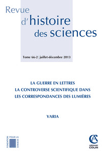
Revue d Histoire des Sciences
Unraveling the Threads of Scientific Thought.Revue d'Histoire des Sciences is a distinguished academic journal published by Armand Colin, focusing on the intricate interplay of history and philosophy within the sciences. Since its inception in 1973, the journal has served as a vital platform for researchers, scholars, and students interested in exploring the historical dimensions of scientific development. With an ISSN of 0151-4105 and an E-ISSN of 1969-6582, this journal is recognized within the academic community, achieving a modest 2023 Scopus ranking of Q3 in History and Philosophy of Science, positioning it within the 41st percentile of its category. The journal offers a prestigious space for rigorous discourse, critical analysis, and innovative research aimed at advancing our understanding of the scientific enterprise's past. While it operates under a traditional access model, the ongoing commitment to rich scholarly content ensures that the contributions will resonate with those dedicated to the intersections of history, science, and philosophy, providing insights into how historical context shapes scientific inquiry and advancement.

PHILOSOPHY OF SCIENCE
Exploring the Depths of Scientific InquiryPHILOSOPHY OF SCIENCE, published by Cambridge University Press, serves as a premier journal at the intersection of history, philosophy, and science, making significant contributions to our understanding of scientific inquiry and its historical contexts. With an impressive impact factor reflected in its 2023 Category Quartiles—ranking Q1 in History, Q1 in History and Philosophy of Science, and Q1 in Philosophy—this journal stands out as a vital resource for researchers, professionals, and students alike. Operating without Open Access, it encourages the dissemination of groundbreaking ideas from 1949 through 2024, illustrated by its robust Scopus rankings, including a remarkable 98th percentile in the History category. Based in the United Kingdom at the prestigious Cambridge campus, PHILOSOPHY OF SCIENCE is committed to fostering scholarly dialogue and advancing critical thought in the philosophy of science.

Epistemology & Philosophy of Science-Epistemologiya i Filosofiya Nauki
Exploring the Intersections of Philosophy and ScienceEpistemology & Philosophy of Science-Epistemologiya i Filosofiya Nauki is a prestigious journal published by the Russian Academy of Sciences - Institute of Philosophy, dedicated to advancing the discourse in the fields of epistemology, philosophy of science, and related disciplines. With a distinguished presence in academia, this journal is recognized for its exceptional contributions, evident through its categorization as a Q2 journal in Arts and Humanities and Philosophy, and a Q1 journal in Cultural Studies. Covering an expansive scope from 2017 to 2023, it facilitates a vital dialogue among scholars and professionals aiming to explore the intersections of knowledge, culture, and education. Although currently not open access, the rigorous peer-review process ensures that only high-quality research is published, enriching the intellectual landscape. The journal's commendable rankings in Scopus, particularly in Arts and Humanities and History and Philosophy of Science, reflect its commitment to scholarly excellence. For researchers, educators, and students, Epistemology & Philosophy of Science serves as an essential resource for understanding and contributing to the ongoing philosophical dialogues that shape our comprehension of scientific inquiry.